[This data is yours to use at no cost, but I do request that you link to this website if you quote or share it. There are Facebook, Twitter and email links at the very bottom of this page to help with sharing.]
Hello and welcome. This is the condensed version of a 250-page report on the Adult MK Survey. (I know!) You might want to perk yourself a mug of coffee or steep a cup of tea and settle in.
What this is:
- A poll of several hundred adult MKs
- A snapshot of commonalities and disparities within the Adult MK community.
- A way to gauge the accuracy of our assumptions about MKs.
- An estimation of the major and minor needs that exist in the MK community.
What this is not:
- A scientific survey. Please understand that this is an informal poll of several hundred adult MKs. Though the results are voluminous, the survey does not meet the standards required to call it formal research.
- A definitive analysis or diagnosis. I leave it to the individuals and organizations viewing this report to draw conclusions and develop strategies with the help of these results.
Your thoughts matter:
Let’s brain-storm together! There are two Facebook comment boxes embedded in the body of this post (one halfway through and the other at the end). Please comment in the space provided. If you don’t have a Facebook account, you may use the form at the very bottom of the post. House rules: any comments that are incendiary or insulting to others will be deleted.
My perspective:
You may wonder why I ran this survey. I am an adult MK and, like so many others, “wouldn’t give it up for the world.” In my full-time work, I teach and mentor MKs of all ages and, perhaps most importantly, advocate for them with the missions that send them and the parents who raise them.
I love to emphasize the blessings and assets we derive from growing up “between worlds.” They are legion! But I also see the need to identify the pitfalls of being raised in an international ministry environment. Addressing them is essential to preventing further injury, fostering a healing environment and allowing the wounded to feel known.
Funding the research:
This survey is available to you for free (with the request that you link to this website if you use it) because I so earnestly believe that it “takes a village” to address MK needs. However, far more MKs participated than I anticipated, which significantly increased the cost of running the survey.
If you would like to contribute to the expenses, I’d appreciate even $10 given toward meeting this need. Please use the “donate” button below. Paypal and credit card payments are both possible.
BEING AN MK
MKs AND FAITH
THE IMPACT OF BEING AN MK
MKs AND RELATIONSHIPS
MKs AND THE WORLD
MKs AND BELONGING
MKs AND BOARDING SCHOOL
OPEN ENDED QUESTIONS
1. My early life (before age of 18) as an MK was:

From 56 comments viewable in their entirety here:
- I had such a blessed childhood with wonderful, godly parents.
- I definitely dealt with issues of loneliness, but in retrospect I had a very good experience.
- Panic disorder, depression, suicidal and many deaths.
- I choose to see it now as the grace of God giving me a unique life experience.
- I had to evacuate one beloved country in war crisis and adapt to a new one. That was the hardest thing.
- Having been separated from my parents for most of my growing up years in wartorn China (WWII) was the difficult part.
- Today I appreciate the experience.
- There were perks, but the constant change, never having steady friends and not knowing family was difficult.
- It’s difficult to decide [on an answer] because I don’t trust my memories.
- There were definitely good times, but they were always riddled with difficulties.
- I loved living abroad. […] My difficulties began when we moved back to my home country.
- Coming home was the hardest part.
- Father [was] married to the job, so home life was tough.
- Being with my parents was great, the boarding school life was a nightmare.
- Not that I didn’t experience any trials (I did), but for the most part I loved being an MK.
2. My feelings about being an MK today are:

Notes: 90.37% of survey-takers (answers A and B combined) look back on their experiences from the standpoint of adulthood and judge it to be positive. As you’ll see in the comments below, that doesn’t necessarily indicate that their lives were problem-free. Though some do have nothing but great memories, others see the net outcome as positive.
From 24 comments viewable in their entirety here:
- So many mixed emotions and pain…but I can’t imagine any other way.
- I feel I have been blessed with a richness most of the world will never know about.
- Why is there not an “I feel strongly both ways” option?
- I’m 63 and have come to appreciate the richness of my life as an MK. Much of it was pretty normal—it just happened in another country.
- It was so hard – so hard that I really struggle to know if it was good. But I know that I learned SO much from it.
- It was destructive to me and our whole family.
- Met people and learned languages.
- I wouldn’t trade it, but I would certainly change some things.
3. The hardest part of being an MK for me was: (Part I)
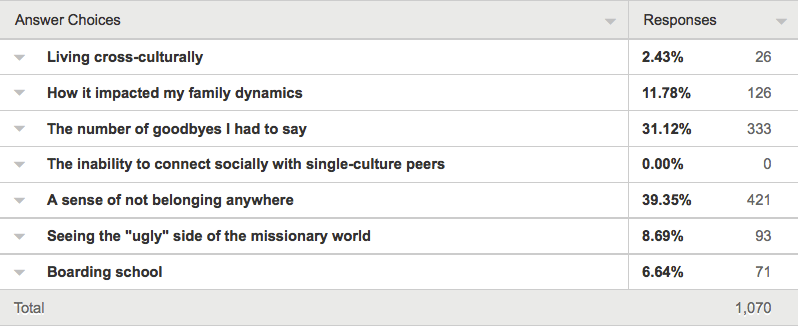
Notes: Belonging and grief have seemed to be the major challenges adult MKs reported. These numbers support that theory.
From 80 comments viewable in their entirety here:
- Coming on furlough.
- Reconciling my own beliefs vs. respect for my parents and the lifelong indoctrination.
- The sense of not belonging came later when I had to go to the US for college.
- Dealing with cumulative and complicated grief without anyone understanding or explaining healthy grief process to me.
- Loneliness and feeling big expectations were the hardest part for me.
- The hardest part for me which I guess falls under “living cross-culturally” was coming to the USA on furlough.
- The number of goodbyes also left a lasting (difficult) impact.
- I have always felt socially awkward.
- I still retain a huge amount of disillusionment for the hypocrisy that I witnessed among the adults around me.
- Giving up friendships on a constant basis was tough.
- The goodbyes helped make me adaptable [&] appreciate genuine friendships too.
4. The hardest part of being an MK for me was (Part II)
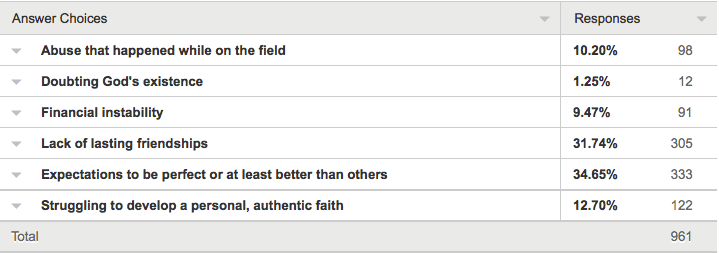
Notes: The “expectations to be perfect or at least better than others” is a complex phenomenon. The pressure can be self-inflicted for many MKs, but is often learned from the churches, mission agencies, friends and relatives who either overtly or implicitly communicate that they must be spiritually and behaviorally superior to their peers.
From 162 comments about “hardest parts” viewable in their entirety here:
- Not fitting in anywhere when returning to the States.
- During war in a foreign country, I was often afraid of losing my parents. It’s not healthy for a child alone to make plans how to survive and what to do if the parents die.
- Little room for grace…much more about rules.
- I think I would have struggled even if I wasn’t an MK.
- Dealing with grief without understanding the grieving process.
- Even though I did say a lot of goodbyes, somehow, I did learn to make friends quickly and as an adult that has helped me adjust to new situations.
- Seeing the stress it put on my family.
- Still struggling with my relationship to christianity. Very allergic towards fundamentalism.
- It became too easy to see myself as better than those around me.
- Separation from things that made me feel safe.
- Being different and needing to defend my parent’s culture.
- Believing I was the least important thing in my parents life and they were glad when I went off to boarding school.
- The constant brainwashing and force-feeding of someone else’s version of an ancient piece of literature.
- Stuffing down grief, saying it was God’s plan.
- Abandonment as a child of 8 going to boarding school.
- Facing tragedy and hardship.
- Deputation in the US, being thrust in the spotlight, unwilling participant in parents’ ministry.
- Constant transitions; interrupted personal storyline.
- Having to say goodbye to every person and place I loved.
5. The best part of being an MK for me was (Part I)

Notes: Dozens of respondents asked for an “all of the above” option for this question, but they were limited to one.
From 36 comments viewable in their entirety here:
- I wish all of the above was an option.
- I have lifelong friends who are more like family.
- I loved the people and the country.
- Getting to know Christians over denominational barriers.
- Was God’s work more important than raising your own kids?
- It taught me what faith lived out to its fullest looked like.
- Too hard to pick between language acquisition, traveling and friendships.
- I feel like living outside my “home” country helped me see it from a more objective perspective and makes me a better citizen as an adult.
6. The best part of being an MK for me was (Part II)
From 93 comments viewable in their entirety here:
- There are amazing memories my parents gave us because of their willingness to go out and experience everything.
- Running in the jungle.
- I loved it!
- Loved boarding school too.
- My parents were very wise in making us a priority, even to make a change in their field of service because they felt it would be better for us as children.
- Why is furlough on this list??? It’s easily the worst part about being a missionary kid!
- Knowing my family was doing what God wanted.
- Living among the Africans.
- Developing a love of art and culture now my career.
- The friendships I made.
- Teaching others about God.
- The freedoms we had like fishing wherever and going wherever we wanted without trespassing, hunting where and when we wanted, etc.
- Godly dad and mom.
- Finding a purpose and meaning for life because of it all.
7. My greatest yearning growing up as an MK was:
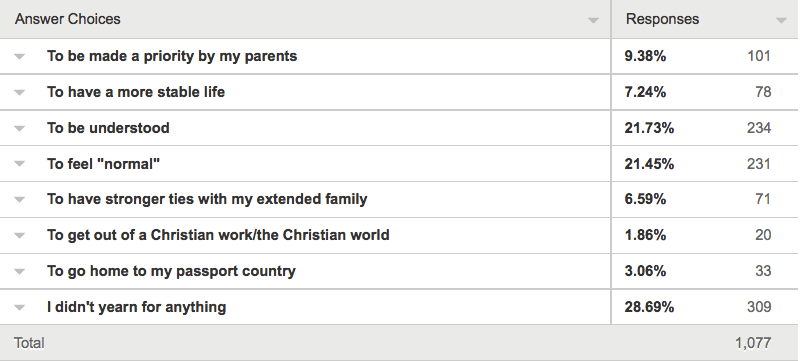
Notes: Yearning to be understood and feel normal (tied at 21%) isn’t surprising. There will be varying interpretations for the 28.70% who didn’t yearn at all.
From 49 comments viewable in their entirety here:
- To marry another MK.
- I was happy.
- To feel free, make my own decisions.
- I just wanted to stay where we were forever.
- To fit in somewhere.
- I wanted to be a missionary too.
- Avoid having to be on “display” on furlough time.
- I grew up in Brazil, and I wanted to be accepted as a Brazilian instead of being treated as a foreigner.
- I was terrified my parents would give up at some point and return back like so many others had in my eyes.
- I yearned to play baseball and couldn’t.
- God really destroyed our family and the future of my siblings and I was the price for my parents being missionaries.
- Finances seemed unstable at times.
- I particularly wanted a deep, meaningful friendship.
- Certain things while being on furlough made me wish people would put themselves in our shoes.
8. If I had children and becoming a missionary were an option, I’d:
Notes: I’m hoping surveys like this will help the 51.42% who want to raise their kids as MKs “with a lot of forethought and strategies in place to make their experience positive.”
From 47 comments viewable in their entirety here:
- I would never go anywhere as a “missionary” rather I would go as a person doing their passion for God in whatever that would look like.
- I’d home-school.
- [My kids] ARE MKs. And loving it.
- Never send them to boarding school.
- Nothing wrong being a missionary, just not my calling.
- I have 3 children and did raise them as MKs. But with forethought and strategies.
- Raise them in the jungle like I was, but not necessarily as an MK.
- I don’t believe in God, so not as MKs, but maybe as TCKs.
- I would have had no problem raising my kids as MKs as long as there were no boarding school involved!
1. My current faith status is:
Notes: This is an interesting category for me. From my interactions with MKs, I would have estimated that a larger number would no longer identify with the Christian faith. I find the 80.97% to be hopeful.
From 50 comments viewable in their entirety here:
- I have struggled with it for years, but it is too ingrained in me to leave it.
- I don’t necessarily believe everything I was taught as a kid.
- I am confused as to what I believe.
- I’ve […] gotten close several times to just giving up on this whole Christian walk.
- I left evangelicalism.
- I’m having a “crisis of faith.”
- I am still journeying in what is my faith to me personally.
- I returned [to the field] as a missionary.
- I am growing in my understanding of God and my relationship with him, even though I have struggled like anyone else.
- I have serious doubts.
- I am a believer in Christ but don’t go to church.
- God is like the ocean, or electricity. A powerful, uncaring force, neither for good or evil.
- I am an earth-based pagan.
- I love Jesus dearly and try to walk faithfully with Him.
- Don’t believe but feel obligated to pretend like I do cuz of parents.
- I am a Christian, but not involved in a church or any other Christian organization.
- I believe in some form of God, that most religions have truth in them but are different human interpretations of a multi-dimensional God.
2. My faith:
Notes: Several respondents asked for a “Had no effect” option to the question.
From 72 comments viewable in their entirety here:
- Couldn’t wait to be free of all the rules.
- I was taught to question and be full of integrity.
- All law and very little knowledge of God’s grace.
- I never subscribed to the belief that bad things couldn’t happen to good people.
- As I returned to the US I could not find a church community that came close to what I was taught church was about. It was far too commercial and individual.
- I struggle with legalism and truly understanding God’s unconditional love towards me until my late 40’s.
- I can’t say if it had a positive or negative effect, honestly.
- Have had to work through a really bad and damaging view of God. My faith was damaged by being an MK for various reasons, but I wouldn’t say it was poisoned. I went through 3 years of doubting God and his goodness.
- My parents lived what they taught.
- My faith in God grew, but my view of other Christians was tainted by abuses.
- My parents made very clear to us that there are no second generation Christians. Just because they believed something did not mean that I did. I was encouraged to search and ask questions.
- God actually used my boarding school experience to draw me closer to Him.
- I’ve learned that the “faith” I was expected to comply with is not faith at all.
- My faith wasn’t “confused” because I was an MK, but simply because of the lack of faith I saw in my parents.
- The sexual abuse I experienced was confusing, shaming, horrific, gross and could have jeopardized my faith, but it was the saving work of Jesus that gave me the courage to deal with all that happened.
- I had times of intense anger towards God, though I never doubted who He is.
- I developed a “performance” based belief system.
- My “loss” of faith wasn’t related to being an MK.
- My MK upbringing strengthened some aspects of my faith journey and challenged others.
- I was fortified, but there were definitely parts that drove me away. God won out though.
3. The positive statement that best expresses my primary view of God is:
Notes: There were several respondents who wanted to select all 6 of the first options.
From 56 comments viewable in their entirety here:
- God is All. He is Holy. All I can do is bow the knee.
- I feel god loves the entire world he/she created and wants the best for all.
- I’d like to believe there’s a loving God. I’m just not sure I can.
- God is bigger than the narrow way he was presented to me in my childhood.
- I don’t agree with the use of the male pronoun for God.
- God’s sovereignty is my comfort and strength.
- The love part still struggles to leave my head and reach my heart.
- My personal belief is that religion is good even though I do not believe in the supernatural.
- He is my quiet provider and protector.
4. The negative statement that best expresses my primary view of God is:
Notes: For those who actually do see a “negative” in God, his being used as an excuse for poor human behavior is significant. In my interactions with MKs, I’ve found that there is some resentment toward the harmful decisions and practices that were attributed to God’s call or directives.
From 71 comments viewable in their entirety here:
- “He is the one who always hurts you” came as a surprise feeling one day because the separations were for him.
- Why did God make me of all people an MK and give me such a timid, depressed personality to represent him and constantly readjust to new faces? SO hard on me, disappointing to my family and didn’t help the mission work any.
- The only negative I can think of would be my tendency to think that God blesses me based on performance.
- If I focus on negatives, I might never stop focusing on them.
- I hold no negative views of God.
- Many of these choices are distortions of the truth about God.
- I am afraid of the things he sometimes asks me to do.
- I have wrestled with God over the years and found that he is strong enough for my doubt and anger and fear and all of me.
- He has favorites.
- God is whatever an individual needs her to be.
- He is unpredictable.
5. The factor that most helped my faith as I was growing up is:
Notes: The responses and comments here show the importance of parents modeling true, vibrant, motivating and merciful faith. Again, many respondents wished it were possible to pick multiple answers and not limit their choice to just one.
From 55 comments viewable in their entirety here:
- My parents aren’t perfect, but they have taught me so much about faith.
- My 9th grade Bible teacher would be a close second [to my parents].
- I’m a Christian despite my experiences growing up as an MK.
- Seeing God at work in the “natural” world was the best thing for me.
- At boarding school, developing personal faith apart from my parents.
- Being taught scripture in a formal church setting.
- Watching genuine, grace-filled faith around me and being surrounded by good Biblical teaching.
- Books.
- Mostly the love and commitment of my parents to Jesus.
- Seeing God meet our needs and answer prayer.
- I would say having to rely on God in tough circumstance and then seeing God at work in the world around me.
- I cannot remember a time when I did not know that God/Jesus was real, even though unseen.
6. The factor that most hurt my faith as I was growing up is:
Notes: We’ve already seen “pressure to be perfect” as one of the negatives of growing up as an MK. It takes the lead for this category in detrimental factors to an MK’s faith.
From 70 comments viewable in their entirety here:
- I just drifted away.
- Hypocrisy, abuse, culture of abuse in missionary circles, etc.
- Loneliness.
- I extended that pressure to God expecting me to be perfect.
- After working through doubts for several months, I decided that yes, what I had taught was indeed trustworthy, and so I cam back to a stronger faith than ever.
- Research that contradicted the Christian view of God.
- Facing faith as a “religion.”
- The separation faith could cause in friendships with peers in the host culture.
- Justifying the suffering and pain and abuse with a “good and protective” God.
- Being taught – implicitly though not explicitly – that Christianity was about fire insurance and behavior modification.
- The legalism that was promoted by the missionary school.
7. My rejection of faith (if applicable):
Notes: Who was checking in on these MKs’ faith as 73% of them were gradually walking away from the faith. “Gradually” indicates that there was time there—time to breathe beauty, compassion, joy and freedom into their perception of faith. Who was modeling grace, mercy and love to them?
From 44 comments viewable in their entirety here:
- I go through phases of rejecting my faith but have never completely turned away from it.
- Many hard long years.
- I don’t believe in Christianity as it exists today and believe it to be more of a myth.
- I rejected Christianity, but have come back to a faith in the Divine.
- I haven’t rejected my faith, but I have lots of questions and uncertainties, which I feel I have to keep hidden.
- I significantly struggled after a personal injury and was very angry at God.
- It was largely after the Kosovo Genocide, years later I came back to the faith, through God reaching out to me, and as a response to the very same horrific events.
- I wandered for nearly a decade, thereby rejecting my faith by my lifestyle, but in my heart, I still knew what was right/true.
8. In the MK community, those who are known to be non-believers:
Notes: I was surprised at how many commented that they’ve never met a non-believing MK.
From 113 comments viewable in their entirety here:
- [They are] pitied and loved.
- Also are shamed. My responses surprise and sadden me here.
- Are loved and prayed for.
- Grudgingly accepted.
- I haven’t met any such individuals.
- Depends on the culture that has been set in each environment.
- I don’t remember anyone admitting to not believing.
- I think they often ostracize themselves…
- Many MKs try to convert MKs who have left and it only makes the non believers angry.
- Since salvation can’t be coerced, the only way I can apply “projects” is by saying they were diligently prayed for and people took opportunities to reach out to them.
- I feel like they aren’t even included or thought of in the MK community.
- I’ve only interacted with one person who professed to be a non-believer and I witnessed the MK community completely embrace him.
9. My faith today is strengthened by:
From 78 comments viewable in their entirety here:
- Really it’s hanging out with Jesus.
- Allowing my day to day life to be my witness as I show God’s love through my actions…
- Nature—God’s creation.
- Also by teaching and corporate worship.
- Focusing on my personal relationship with Jesus is foundational.
- Making the world a better place.
- Serving and building relationships with the most vulnerable in my community—the physically poor, mentally ill, ostracized outside of “normal” society.
- Exploring and understanding the historical church.
- Seeing tangible, personalized and emotional ways God cares for me and others.
- I have walked enough of both deep valleys and high mountaintops in God’s company to KNOW God not only theoretically, but experientially in ways that cannot be taken from me.
- Serving others.
- Witnessing individuals who truly love God and others.
1. Because I’m an MK, I:
From 108 comments viewable in their entirety here.
- I crave permanence but don’t know how to be permanent.
- I think I have found a decent balance, but the desire to up and travel is often huge.
- Two years is about our maximum [in one place].
- I haven’t been in a permanent situation long enough to know how I’ll cope.
- I naturally dislike change and have a desire for permanence, but […] I can’t imagine living in one place for too long.
- Both sides still cause pain.
- This is changing as I have married an MK who can relate to me and me to her. It finally gives me a place of belonging.
- I crave permanence but feel like I don’t know how to obtain it.
- I think that when I do not have a sense of permanence, I strive for a taste of it. However once I actually attain permanence, I buck it off.
- I have wings but crave roots.
- I tell my husband I need to get out of the US about every six months to stay sane.
- I crave permanence in friendships. But I crave change in where I am.
- I have found contentment in “temporary” permanence though I still yearn for change.
- When we get the itch to move and can’t, we rearrange the furniture. We’re both MKs
- I yearn for roots but am amazed at my perennial ability for rather substantial change.
- God gave me a non-MK spouse who loves to move. A bigger gift than I originally realized.
- Although I crave permanence, I’m always afraid of it.
2. My parents:
From 96 comments viewable in their entirety here:
- They mean well, but expected too much from me at times.
- They are open to hearing what I feel and have felt and I’ve always known I can talk to them.
- They feel guilt.
- I don’t think it’s ever really come up.
- Not that they understand, but they do care.
- They do indeed [understand] because they’re both MKs.
- Their every comment is “you must be more like your passport country.”
- They have their own burden of being missionaries.
- They truly try to understand and realize that there is an extent to which they CAN NOT understand.
- The abandonment I experienced from being sent to boarding school at age 11 has, to this day, to be fully understood.
- They’re more worried about their lives.
- My dad is an MK so he understands.
- I don’t think they realize how disconnected from extended family we feel.
- My mom has finally tried, about 6 to 7 years after being back in the passport country. My dad continues to view it as “victim mentality” and useless to understand because it is wrong.
- They truly cared for us but did not understand the impacts on us.
- Anything bad that happened was God’s will.
- I think my parents generally understood better than they said. Meanwhile, they had to deal with incredible pain and guilt due to what they knew we went through
3. As an MK, I feel:
From 59 comments viewable in their entirety here:
- This has gone from “really different” to “slightly different” with age, counseling and being forced to stay in one place.
- I’m fine with who I am.
- Still struggling at forty.
- Seeing people as “marks,” potential supporters or “sinners.”
- It took 10 years to feel well adjusted back in the States.
- I feel more of my differences come not from being an MK, but from my faith itself.
- As I’ve gotten older, I realize I’m not so different.
- I spent most of my time in college trying to fit in. Other MKs disliked that and I felt ostracized from the group.
- I can identify the ways I feel slightly different from non-MKs and when needed I can adjust those.
- Sometimes I still miss cultural cues and am misunderstood. Those occasions are becoming less frequent. I am age 52.
- I tend to “adjust” automatically when in a new group setting.
- That’s why we often marry other MKs—they know what it’s like.
- I still feel left out, but I can look like I fit in.
- Adaptation was hard but achievable.
- I feel privileged for my experiences.
4. I feel that my differences as an MK come mostly from:
Notes: Though it wasn’t offered in the multiple-choice options, there were several mentions of loss/trauma as a cause of “difference” in the personal comments.
From 96 comments viewable in their entirety here:
- Missionary life has no relevance to “real life.”
- [Also from] dealing with loss and trauma.
- There are good differences, like being fluently bilingual.
- Living dominantly in a culture that is not yours but you want to be yours, you strive to be the most like that as possible. Parts of me changed because I loved the culture around me even more than my own.
- Being away from friends/family/N. American culture for years at a time.
- Continual change of environment.
- The everyday differences are slight, like how you use your cutlery […]. The ones that make you question yourself or feel disdain for your passport country are ones that are much harder to overlook and try to “adjust” to – how US Christianity treats the LGBTQ+, the legalistic ways we respond to some ideas that are good, but difficult to understand.
5. The age when I realized that being an MK had had an impact on me was:
Notes: The fact that a majority of MKs begin to realize their differences as teenagers emphasizes the importance of education on that topic during those years and before the precarious phase of entering adulthood.
From 49 comments viewable in their entirety here:
- When I came back to the US for an extended furlough as a teenager and realized then that I was very, very different from “normal Americans.”
- It was mostly the social effect of having to leave school friends for a year of furlough & then come back & everyone’s moved on.
- When I was younger, I saw it as a positive impact only. At age 18, I started to see more of the hardships though not too badly. It was still overall a wonderful benefit.
- I realized that I was blessed, and my differences were not just because I was eccentric.
- I got married and realized how messed up I was.
- It was only in my 20s when I read Third Culture Kids that I was finally able to realize the full impact it had on me.
6. I think that being an MK:
From 32 comments viewable in their entirety here:
- It’s a blessing when used and thought of properly. It’s a curse when you let it get the best of you.
- I have deliberately become different in so many material ways that it’s just another thing on the list.
- …but it is not the only thing that defines me.
- It used to greatly identify me, yet I hated being known as the MK. However, now it’s a toolkit of experiences that few could share in.
- It is not my identity but does account for some things I do and my perspective on some things.
7. The greatest difference between MKs and non-MKs is:
Notes: there were a lot of calls for “all of the above” on this one.
From 82 comments viewable in their entirety here:
- All of the above in spades.
- Not all MKs have a broader worldview.
- Difficulty relating to people of different beliefs, origins and mindsets.
- I actually feel like I fit in better with non-MKs because I’m extremely liberal, an atheist and gay.
- I also think the ability to adapt and adjust is more prevalent in MKs.
- MKs tend to immediately think that an argument or dissonance between two people could be based on a difference in culture or upbringing. People who didn’t grow up overseas rarely see that as a possibility and rarely try to accommodate it.
- [It’s] sometimes not really a recognizable difference.
CONGRATULATIONS – You’ve reached the halfway mark! Scroll past the comment box below to read the rest of the survey results.
1. I identify as:
Notes: A few respondents were not familiar with the LGBTQ label. Some of them may be non-North-American, where the acronym is more broadly used and recognized. Others just might not have much to do with matters related to the Lesbian, Gay, Bisexual, Transexual and Queer community. One respondent asked “Why is this relevant??” I’d love to answer that in two ways. One, because I think we’ve ignored the fact that there are LGBTQ MKs. I think it’s important for us to acknowledge them and include them in the demographic measurements we’re taking. The second reason is for the sake of this respondent, who wrote, “THANK YOU FOR ASKING THIS. God no one ever does. Tears.” Though stats vary, the population of MKs who identify as LGBTQ seems a bit lower than the statistics for the US (3.4%) and Canada (5%).
From 20 comments viewable in their entirety here: (Scroll to page 25)
- What is the LGBTQ community?
- The LGBTQ is a brand new concept to me.
- THANK YOU FOR ASKING THIS.
- I am a straight ally and actively advocate for LGBTQ rights.
- You did not allow a category for being gay but not in the gay community.
2. My current relationship status is:
3. I married or am in a long-term romantic relationship with:
4. Because I’m an MK:
Notes: Several respondents wondered how much of this is MK-related and how much is just being human. Good point! Personality will also have an impact in this category. These factors, along with “being an MK,” will impact the relationships of each individual respondent differently.
From 128 comments viewable in their entirety here: (Scroll to page 25)
- I both crave and sabotage them.
- I crave deep relationships but find them extremely difficult to make.
- It takes me a while to allow others to delve deep.
- Crave, but avoid until trustworthiness proven.
- Most folks don’t get close enough though they often think they do.
- Crave but avoid them because I won’t be understood or I’ll be known to be too strange.
- I also avoid them due to not wanting to say goodbye.
- I am not good at upkeeping them when they are not in my current geographical location.
- It’s usually not worth the tie and emotional energy to persist in holding onto relationships with people I only see once in a while, no matter how much I love them, miss them and reconnect when I see them again.
- I crave them but also fear getting too close because I can’t handle the thought of losing another close relationship.
5. I think that being an MK:
- I always ask myself “Am I going to know this person for a long time?” If the answer is no, then I don’t go any further than a surface level relationship.
- Confusing is not the right word. I would say challenging, complex.
- Lack of cultural connection […] can make it more difficult to connect.
- The constant loss of friends over the years makes it difficult to engage in any deep relationship and I have seen [the] effects of that on my current dating relationship.
- Having moved many times has taught me how to make friends again and again.
- It makes me go deeper, more intensely into relationships and be more blunt and honest.
- Relationships with non-MKs are harder for me.
- [It’s] both easier and harder. Ease and strength at connecting quickly and deeply and with many…but also complexity of a lot more walls/struggles with deeper intimacy.
- I expect more.
- Especially leftover pieces of culture from where I grew up. Eg. Not looking a guy in the eye sabotaged my schooling for a long time when I had male teachers. You can guess how hard it was to be friends with boys, let alone have a relationship.
- It’s hard to quantify whether my challenges are MK challenges or personality challenges.
- I can say goodbye to people much too easily.
- I want that depth of relationship but don’t know what it looks like to invest long-term.
- Once upon a time, I would have said that being an MK made things harder, but after having worked through some of the emotional scars that came from constant moving and losses I have come to crave relationships more and am more open now than ever.
- I can easily connect and go deep with anyone however I don’t always feel on the same page.
6. As an MK, I think the greatest detriment to relationships for me is:
Notes: There were several calls for “none” and “all” on this question.
From 79 comments viewable in their entirety here: (Scroll to page 25)
- Separation was a given, so I chose not to invest too greatly while overseas.
- Sharing too much, too soon.
- Relationships are what I am best at and what I value most.
- I think my sinful nature has more to do with struggles in relationships than my being an MK.
- Fear of painful loss.
- I continue to jump friendship levels and attempt to develop deep relationships too quickly. I feel like I overwhelm myself and the new friends that I make.
- I cried [for the last time] when saying goodbye when I was 13. After that I just never attached to avoid the pain of goodbye.
- I’m awesome at my (very few) relationships.
7. The closest relationships in my life have been with:
From 106 comments viewable in their entirety here: (Scroll to page 25)
- Whether someone is an MK or not doesn’t affect my close relationships.
- Some of my closest college friends are non-MKs and they are like sisters to me.
- My closest friends all grew up overseas.
- I have a mixture of close friends who are MKs and non-MKs.
- Family was the only thing that never changed.
- It has been different at different stages of my life – am 73.
- I have true and close friends from every country and social circle. I will put down roots even if I’m moving next month.
- I struggle relating to other MKs.
- This has changed since I have found contentment in where I am.
1. The desire to visit my foreign countries/homes:
Notes: There were several comments that indicated that an MK’s strong desire to go home decreased after a repeat visit. This has been verified among MKs I’ve worked with. Once they’ve gone back to a place that used to be home and seen it through new, non-belonging eyes, the deep yearning eases a bit.
From 46 comments viewable in their entirety here: (Scroll to page 49)
- It was strong and constant until I went back.
- The years pass and I do miss it, but I see life moving on.
- Especially some smells, like chili, eucalyptus and smoke, remind of Ethiopia in a sweet way.
- Strong and constant as a young adult, reversed around age 50 or 60.
- My desire was constant before going back.
- I’ve figure out that it is not so much the place but the time and experience I miss.
- The desire has decreased as the number of years increases that I have not lived there.
2. The desire to move back overseas long-term:
From 50 comments viewable in their entirety here: (Scroll to page 49)
- This seems to be waning as parenting takes more of my attention.
- My birth home is not the USA, but I have married and settled here with my non-MK husband. The need for stability has taken away the desire to move out of the States.
- This is driven by a desire to help spread the gospel, not to live in a non-American context.
- I want to travel overseas, but not move there.
- I want to stay where I am.
- Used to be strong and constant. It changed when I had kids.
3. My understanding of the broader world (global awareness) has been most useful:
From 26 comments viewable in their entirety here: (Scroll to page 49)
- Meeting people from around the globe is so exciting when I can relate and understand why they do things that way and what they mean when they say this.
- Enhanced Biblical worldview because of my global awareness.
- I find myself utterly confused and upset by nationalism.
- It’s amazing what my experiences have done for my resume and for my career goals.
4. Seeing pictures of places I’ve known:
From 33 comments viewable in their entirety here: (Scroll to page 49)
- I wish I had more mobility.
- Happy to recall those places.
- Mixture of feelings. It was the best of times, it was the worst of times.
- Really it’s mixed emotions. Hurt, anger, happy, sad.
- Depends. If I see war in my country I am angry. If I see god things I am happy.
- Sometimes I avoid looking at pictures, even for years, because I don’t want the heart pain. It’s sad because I miss it, but the memories are precious, not negative.
- Makes me feel really weird actually. Like, drawn and repulsed at the same time.
1. Belonging (identifying with a community and being accepted into it):
Notes: Redefining “belonging” as a choice rather than something organic seems to have helped many of the commenters to feel they’ve found it.
From 64 comments viewable in their entirety here: (Scroll to page 59)
- I rather decide to make my own community.
- I have chosen to enjoy limited belonging in multiple groups.
- It’s something you can find no matter where you live if you really want it.
- I rarely feel I really belong, but it happens with creative people who love what I love.
- I am learning to ground myself in myself where I can be at home in my own soul, body and mind.
- My experiences are not as impossible to relate to as I once thought.
- I might be believing a lie that I will never belong, but should really try to get past that and try and find acceptance in small areas of the larger community.
- My identity stems from who I am in Christ.
- I’ve found it multiple times in different communities, but never FULLY belonging.
- I belong and am accepted, but I know I am so different.
- I find that my own family now (husband and kids) satisfy this desire in an acceptable way.
- This is where my faith helps me.
- It’s something I’ve ALMOST given up on.
- I’m okay with the level of belonging I can find in my current community while also recognizing and accepting that I will only feel truly at home once I’m in Heaven.
2. I think the main reason many MKs struggle with belonging is:
Notes: Of the two main responses, one is an attitude that can be changed and the other can be learned. That’s good news for MKs willing to put in the work.
From 75 comments viewable in their entirety here: (Scroll to page 59)
- A sense of impermanence.
- All of the above can be true.
- We were taught from an early age that roots are fleeting and nothing is permanent.
- Home schooling and living in a bubble.
- We are mentally wired for a uniquely blended culture that no longer exists aside from those who experience it with us.
- I’m afraid our TCK subculture may fetishize “the unique.”
- We create another culture for ourselves that we can survive and thrive in.
- Those who have been able to recognize that people are people the world over […] adapted just fine.
- Culture affects our relationships, interests and even maturity.
- It’s easy to make ourselves the victim instead of seeking God and keeping giving our best efforts in relationships.
- Too many folks cast themselves as either victims or being different. We are no longer as unique or special as we thought we were when growing up.
- Not being willing to find ways to identify with the passport country like [we] did with the country [we] grew up in. Both countries need our understanding not to “serve” the MK.
3. The chapter of my life when I have most strongly felt “belonging” is:
From 103 comments viewable in their entirety here: (Scroll to page 59)
- Throughout my life, I have always had a strong sense of belonging, not necessarily in every setting.
- I have also found a strong sense of belonging by becoming an active member of a church in the US that serves members of the country I grew up in.
- On the first day of married life, I had a strange sense of marriage being my first relationship in which not to expect separation.
- I belong wherever I am.
- I belong everywhere and nowhere.
- My teen years living in the tribe with my parents is where I put down emotional roots. And since then by far the longest chapter of my life of “belonging” has been with my husband and kids.
- With other expats, no matter which country, but more so in my “foreign” country.
4. Lack of belonging:
From 49 comments viewable in their entirety here: (Scroll to page 59)
- I always belonged with my family.
- I think belonging can be learned and constructed, consciously.
- I miss home, love life here, but can’t wait for heaven because it’s the only place I will EVER really belong.
- Hurts me daily in varying degrees in the form of feeling desolate.
- I would never change my overseas experience for the world.
- I’ve learned how to let the blessings outshine the negatives. It’s a long and hard process, but the truth is it is a blessing.
- You can always find common ground.
- This being “okay” has come with age. I may be okay, but it is painful.
- I associate self-worth with belonging.
Notes: It’s significant to note that 13.99% of MKs answered “boarding school” in the previous question about “best part of being an MK.” That in no way lessens the experiences and challenges of those who found it difficult or toxic.
1. I went to boarding school because:
From 80 comments viewable in their entirety here: (Scroll to page 70)
- I wanted to keep going to boarding school. It was one of the best experiences in my life.
- It was [boarding] or forsake my education.
- At my time and where we lived, that was the only way to get an education. What else were our parents supposed to do?
- My parents had us be part of the decision and we prayed about it together.
- It was mission policy, but there wasn’t any other practical option.
- I wanted to go to boarding school so I’d be with MKs who would understand me, but wasn’t allowed to.
- I begged to go as I felt isolated being home-schooled in a remote place.
- M parents left the decision up to me. I had complete peace from God about it. I developed socially at boarding school in ways that I couldn’t possibly have at home.
2. My experience in boarding school was:
From 52 comments viewable in their entirety here: (Scroll to page 70)
- [Boarding school was] my home: best time of my life so far. Only real relationships I’ve had cultivated there.
- It was great!!! Such an important season of my life!!
- Elementary school was super hard. High school was fun.
- Very rough hard times around some fanatic authoritarians.
- First boarding school was awful. I came home after 3 months. Second boarding school was fantastic.
- In many ways, boarding school expanded my interests, brought me out of my shell and made me a more well-rounded person, with more school activity options than were available in my parents’ town of service.
- My education was excellent and has served me well. […] At the boarding school, I grew up an orphan.
- AMAZING! I loved boarding school.
- The negative stuff stayed with me for years.
3. The best part of attending a boarding school was:
Notes: Several MKs stated that boarding school is where they first felt that illusive sense of belonging. Several also wished they could choose multiple answers from the options given.
From 51 comments viewable in their entirety here: (Scroll to page 70)
- All of the above!!
- Let me get used to being away from my parents since I knew I’d be returning to the US in 2 years.
- Didn’t feel it helped me prepare for college.
- I have life-long friends who are more like family!
- Teachers loved me up.
- There was nothing good about it.
- Can’t say enough good things about my boarding school and the adults and my peers there.
- Experiencing a new country, living with people who I didn’t have to explain myself to.
4. On the topic of abuse in boarding schools:
Notes: This is such an intimate, delicate and traumatic topic that I hesitate to list just a few of the comments below. Seeing that so many of the respondents didn’t experience abuse is comforting, but not for those who did. For a better understanding of responses, please view the entirety of the comment section. We still have a lot of work to do both in preventing further instances of abuse and in assisting those who have been harmed by it.
From 50 comments viewable in their entirety here: (Scroll to page 70)
- I know that it happened to my siblings.
- I experienced sexual abuse as an MK, but no in boarding school. Abusers were locals involved in my parents’ ministry.
- It was among the MKs, not the staff.
- I only heard about it since adulthood.
- Mainly saw a lot of manipulation by faculty.
- The terms “emotional/verbal abuse” apply to such a wide range of behaviors that I feel I should not answer this question.

The following four questions were entirely open ended…and they each got upward of 500 answers. At some point in the near future, I’ll compile and categorize them, but until then, I’m listing just a handful below.
1. The one thing I wish my parents had done differently is:
Notes: The most common responses here had to do with lack of preparation for transition to the passport culture, parental neglect, the need for counseling and a desire to have learned the national (foreign) language.
From 554 comments viewable in their entirety here: (Scroll to page 85)
- Wish they’d prepared me for being an adult in the US.
- Nothing.
- Provided more support on learning the national language.
- Taught me more about life in [my passport culture].
- Spent more time talking about God’s love and grace versus God’s need for obedience and punishment.
- I think they did the best they could with what they knew.
- I wish my dad had been more verbal in expressing his love for me.
- Take time to seek counseling for their marital issues.
- Visited my passport country more often.
- I was blessed! Nothing.
- Not sent me away to boarding school when I was six.
- Taken more breaks/vacations.
- Provided comfort.
- Not put the mission first and treat us kids as an inconvenience.
- Given me more life skills—doing taxes, going to DMV, etc.
- Prepared us better for life after leaving home.
- Been real…too long on the missionary pedestal!
- Make more of an effort to help me keep in contact with my extended family back in my passport country.
- Not become missionaries.
- Validate and openly discuss grief and lies about God related to grief.
- Visited me at boarding school more often.
- Pursued emotional intimacy with us kids.
- I wish they could have been around more for life’s transitions into adulthood: college, careers, marriage, birth of children, etc.
- Pushed me more.
- Told me I didn’t have to be perfect.
- Taken vacations on furlough.
- Helped me process what it means to be a woman as I was growing up in a Muslim country.
- My parents were learning just as much as we were…they did the best they could.
- Sought outside help from a counselor for family/marriage problems.
- Made time.
- Tell me how much they love me.
- Not being so demanding of needing to be “perfect.”
- I wish they had read the Bible and prayed with us more as kids.
- I wish they could have had a form of accountability.
- Allow me to stay in boarding school longer.
- Not home-schooled me.
- I wish they had been more understanding of who I am as an individual.
- Been more aware of what it meant to be a Third Culture Kid.
- Returned to the same place every furlough.
- Talked to me more about what being an MK, being a TCK meant.
- Clearly communicated to us that we were as important as the ministry.
- Learned about my interests.
- Not assumed all other Christian workers/missionaries were safe, healthy people.
- Talked to me more about important things.
- Been a bit more understanding when we made our first international move.
- Been more willing to show weakness.
- Prepared me more before we left to the field.
- Wish my father would have written us letters and expressed his love, and not just my mom.
- I can’t think of anything [they could have done better].
- Talked to me. Expressed their love, their fears, their hopes and LISTENED to me when I tried to explain what I was going through.
- Sent me to boarding school sooner.
- They didn’t have MK-related resources at the time, so they did the best they could.
- Exposed us to secularity.
- Consulted me EVERY YEAR about things at the boarding school, not just after the first year.
- Prioritized. For the most part, I was not neglected but occasionally I felt I came in second to the ministry.
- It would be easier to accept their ministry if it wasn’t forced on me, with no explanations.
- Gotten mental help much earlier than they did.
- I wish they had helped [us] process all our moves.
- Taking responsibility for making us move constantly rather than blame it on “God’s will.”
- Exposed me to more of American culture.
2. The one thing I wish I’d understood better about myself as an MK is:
From 511 comments viewable in their entirety here: (Scroll to page 103)
- I wish I understood that it was ok to accept the cultures I was in and to make them my own.
- That it’s okay to be different.
- That leaving is a grieving process.
- How deeply my mentality regarding relationships would affect me when I came back to [my passport culture].
- What I struggle with is normal for anyone who has been through what I have.
- Self-confidence / self-reliance.
- Raising support lead to me seeing people as a means to an end.
- I’m not perfect and I can’t earn my salvation through works.
- What parts of me are just my personality and family background, and what parts of me are because I am an MK.
- It is okay to be different.
- You will eventually feel normal.
- That I would experience more loss than the average person my age.
- I was experiencing normal culture shocks.
- How to put down roots.
- I was good enough as is.
- How [being an MK] affects making friends.
- Sometimes it is terrible and awesome at the same time.
- Goodbyes would never get easier, but instead harder.
- Jesus loves me and I don’t have to beg for forgiveness.
- Struggles with faith are OK.
- Different is good, not bad, as long as I can communicate with and thrive in my surrounding culture.
- God himself comforts us in all of our affliction. Ask for it, watch for it.
- I’m as imperfect as every else and God loves me unconditionally.
- I wasn’t the only one with these feelings.
- That I will survive.
- The long-term effects of detachment disorder.
- Where does the sadness come from that surprises me every once in a while?
- My frustration with [my passport culture] is normal, but something that needs to be addressed in a healthy way.
- I am valuable.
- To express when something felt uncomfortable or wrong.
- How loss and moving effects relating styles.
- To have valued my experiences and travels more.
- I can relate to non-MK/TCKs.
- Although I feel weak, I was actually very strong to survive leaving home at age 10 and basically bringing myself up.
- It’s okay to be LGBT or non-christian.
- Not to put such pressure on myself to be perfect.
- God loves me very much and I am special.
- It was a privilege.
- Just because I had cross-cultural experience, that didn’t make me superior to my mono-cultural peers.
- The feelings I experienced weren’t because I was unlikable, weird or unwanted.
- I just needed to be me.
- I wish I would have understood it is ok to hate some of the things that come with being an MK.
- I’m not as important as I think.
- I don’t fit MK stereotypes and that’s okay.
- Cultural differences run deeper than just how you do things.
- It’s ok to hurt, to be angry at god, to not be perfect, to be messed up.
- How arrogance prevented me from making any friends in college.
- Everybody struggles as teenagers, not just MKs.
- How I can love and hate my experiences simultaneously.
- That the desire to move and not put down roots can be lifelong.
- The opportunities that will come later in life because of my upbringing.
- Why I feel guilty about not becoming a missionary myself.
- My faith.
- Making mistakes is a good thing.
- That I would be scared of being in one place for the rest of my life.
- That’s it is okay to let people in, get to know me, even if it is just for a while.
- I’m not alone.
- How extraordinary and special my life has been.
- I am not anyone’s saviour.
- It’s just one piece of your life.
3. The only thing I wish people understood better about MKs is:
From 536 comments viewable in their entirety here: (Scroll to page 118)
- When they are children, treat them like children and not missionaries.
- We straddle two worlds and they shape us.
- WE HAVE REALLY INTERESTING THINGS TO TALK ABOUT!!!!!
- We may seem confident but inside we are a quivering mass of jelly afraid that we’ll be laughed at or stared at.
- We’re not perfect.
- We are immigrants everywhere we are.
- We have many unique things to offer.
- Just because we’ve traveled a lot doesn’t mean our parents are rich!
- How we feel as outsiders.
- We want to be asked questions and understood.
- We aren’t our parents.
- When back in parents’ home culture, [we] are foreigners, immigrants, and those [we] look and sound the same as our surrounding culture.
- We are just regular people with the same needs and wants.
- Our hearts are in many places.
- That we have a lot to offer if [you] would just take the time to listen or care.
- We need love and acceptance after we leave our parents on the field. It felt like even my own mission board forgot about me.
- We are a culture unto ourselves.
- We sometimes react out of our insecurities.
- We don’t all live in the jungle.
- We feel connected to more than one nationality, and that’s okay.
- The words “home,” “foreign” and “overseas” are very complicated.
- [MKs] are not the ones that felt God’s call—they were just dragged along for the ride.
- When we go on furlough, it feels like the most stressful time. We don’t feel like we are home, but everyone expects us to be happy and so grateful to be there.
- Being different is a good thing and not a reason for ostracizing someone.
- Sometimes [we] need help switching from the “home” country to the “passport” country.
- We’re varied. One size does not fit all.
- Not all of us like our host country more than our passport country.
- No, we’re not better. Yes, we’re different. No, you don’t understand where we’re coming from and vise versa. You listen to me, I listen to you. Let’s be friends.
- When we act in ways that seem culturally inappropriate, we’re probably not being rude on purpose.
- We are not automatically religious.
- We may come from a different culture and background than you but we’re not really any different at heart.
4. The one final thought I’d like to contribute to this research on being an MK is:
From 452 comments viewable in their entirety here: (Scroll to page 137)
- I love being an MK!
- I’d do it all over again.
- It’s important to not box in an MK, as our experiences are quite varied.
- Pray this generation has a better support network than we did in the 60s.
- I couldn’t ask for a better, more solid foundation.
- I have greatly struggled with feeling that my life in suburban America is important and meaningful.
- My siblings and I would all consider our childhood as unusually wonderful.
- The family dynamic needs to be safe for kids to voice their desires.
- How parents say goodbye affects an MK greatly.
- The experience of being an MK is so broad that it’s hard to quantify.
- I think personality plays into how MKs adjust.
- Being a missionary kid was an amazing experience but in no way defines me.
- There are many positives and negatives.
- [There’s a] need to help returning MKs engage with their faith independently of their parents.
- It takes longer for us to begin to trust others and even God’s love for us sometimes.
- Healing takes time.
- The pluses overshadow the negatives by far.
- Emotionally connected parents can make emotionally connected kids.
- I’ve learned that Home is not a place on the globe.
- Missionary parents need to understand that God gave them a family first and a mission field second!
- We can’t see ourselves as more special than others.
- I am grateful now after all the messiness, but it’s taken almost 20 years.
- I don’t think people with children should be missionaries.
- Being an MK is the source of my greatest joy, and greatest pain.
- It is great how the support of MKs has developed in the last decades.
- I like where I’ve ended up personally and spiritually, despite my beliefs not looking like my parents.
- My husband and I are both MKs and now we are raising our own 4 MKs. But I hope that we are doing it with more conversation and insight and proactivity for our kids than our parents did.
- There are no blanket answers for every MK.
- The 3rd culture experience gives immense advantages in our global society.
- I have found over the years that there are few MKs neutral about being an MK.
- God is enough to heal every wound and make every story beautiful for Him.
- I feel that who I am is more strongly defined by how I was raised… In a loving, grace-filled home.
- I wish MKs didn’t look down on their “hone” countries so much.
- I don’t want to be pitied, nor do I want to victimize myself. I don’t regret the hardships or the struggles. I have seen, earned and experienced so much more than could’ve imagined.
- Holding on so tightly to your identity as an MK can be detrimental later in life.
- What a privilege it is to grow up as a world citizen.
- There’s a tension here: it’s important to talk and think about one’s identity and experience as an MK, yet we have been taught that it’s not supposed to be about us.
- My parents did a fantastic job balancing their ministry in the village and raising their family.
- Friendship and belonging is a two-way street.
- Our whole lives are affected by this chapter, but the whole of our life does not derive from this one section alone. We all must grow as people into all areas of life.
- My parents were amazing. We were included in ministry and never felt like we were not their priority.
- Being an MK is like a secret club where you can meet all over the world and instantly know each other.
- I would suggest we be intentionally non-judgmental toward those who have departed from the faith of their missionary parents.
- I have learned to capitalize on what being an MK has given me.
- Being an MK can be hard. But sometimes, we seem to pity ourselves too much.
- Despite the loss and confusion and lack of belonging, I wouldn’t change being an MK for anything.
- I often wonder if the dull ache of homesickness will ever completely go away.
- Being an MK is wonderful, hard, beautiful and rewarding.
To be emailed a .pdf of the survey results (250 pages), please contact me directly at michelesblog@gmail.com. This data is yours to use at no cost, but I do request that you link to this website if you quote or share it. Thank you.
~~~~~~~
Please join the conversation by sharing your thoughts in the Facebook comment fields above (after each section) or in the generic comment box below. If you have trouble with it, you may also email me your comments and I’ll post them in your name. Thanks so much. (michelesblog@gmail.com)
Again, if you would like to contribute to the expenses, I’d appreciate even $10 given toward meeting this need. Please use the “donate” button below. Paypal and credit card payments are both possible.




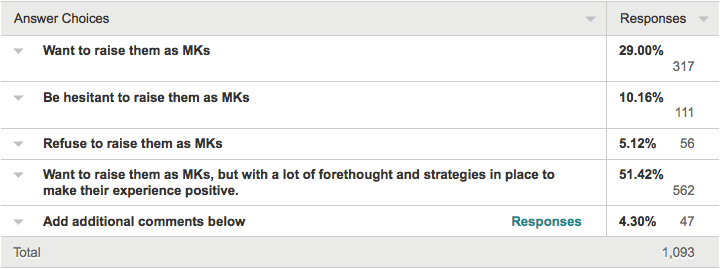

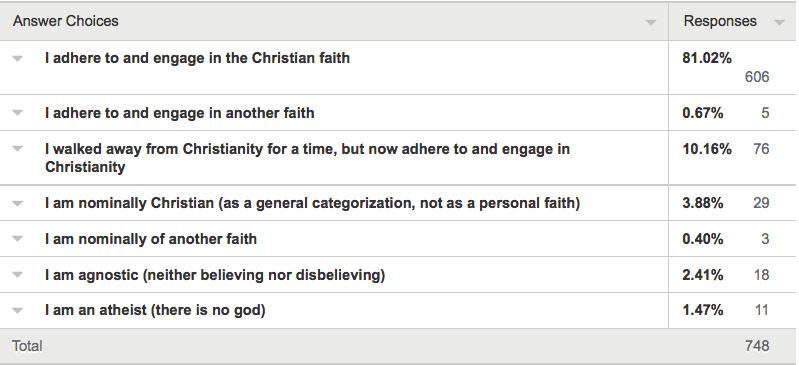
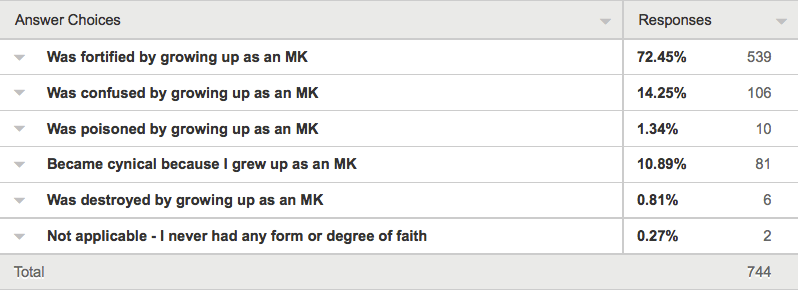
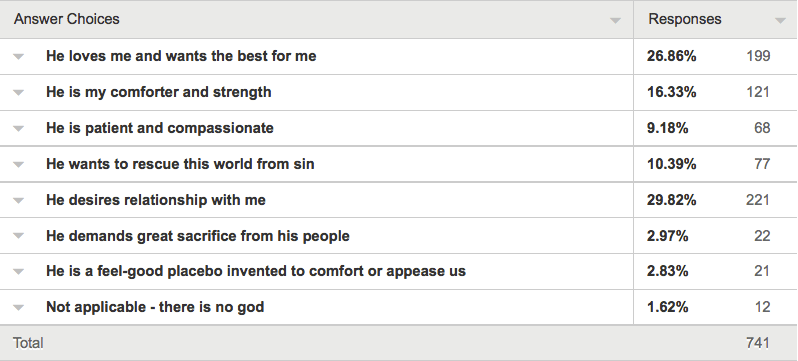
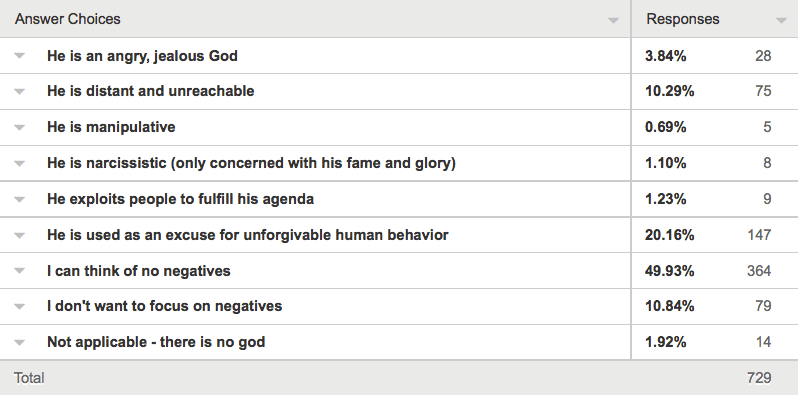
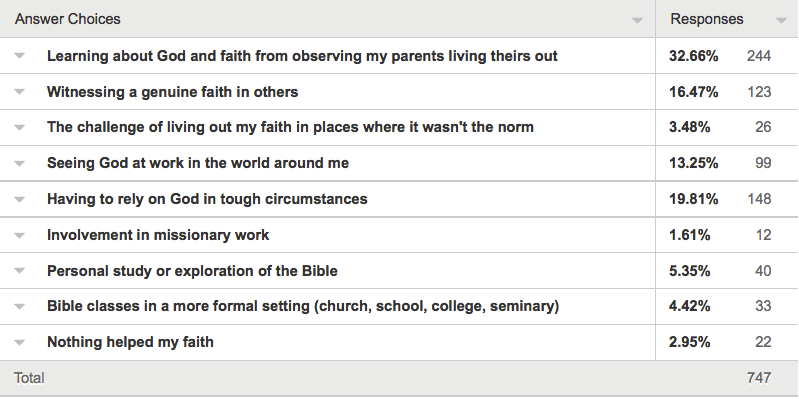
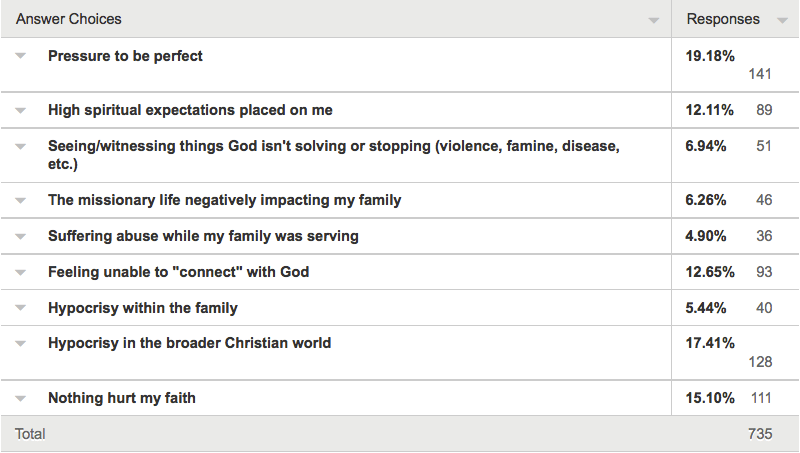


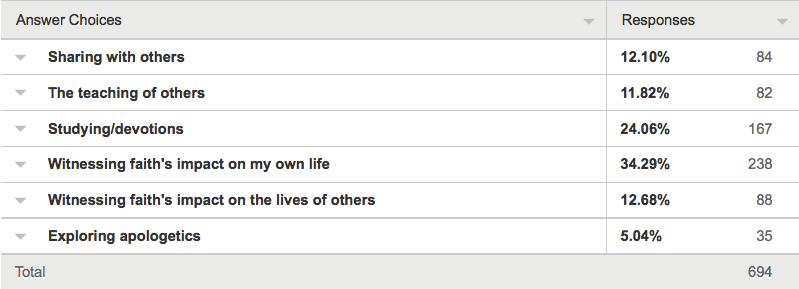



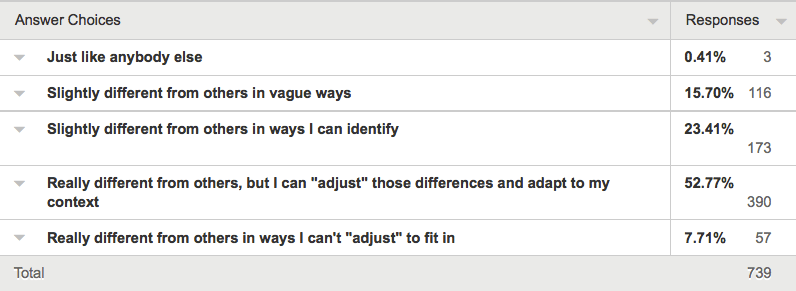
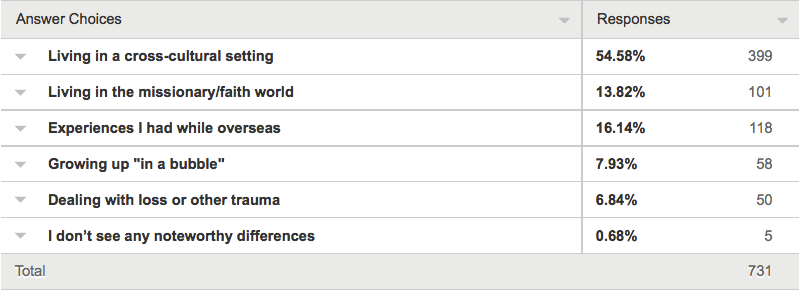


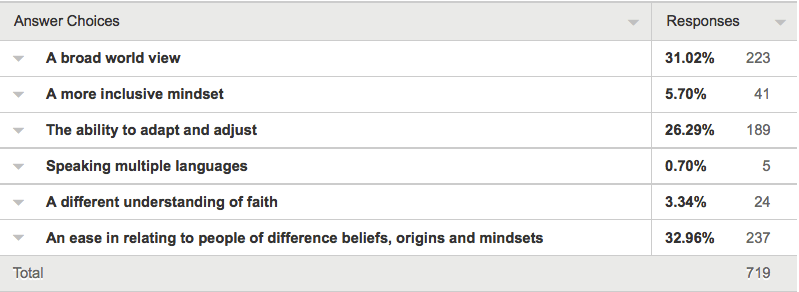


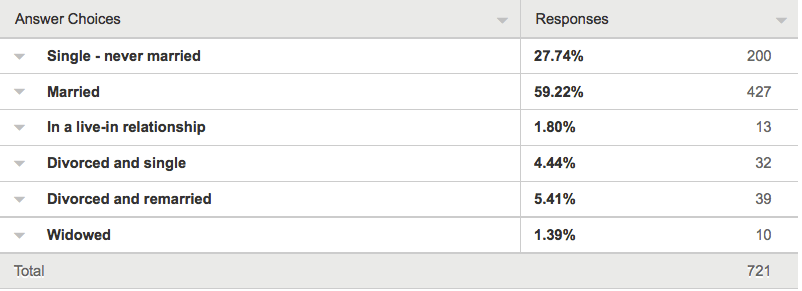



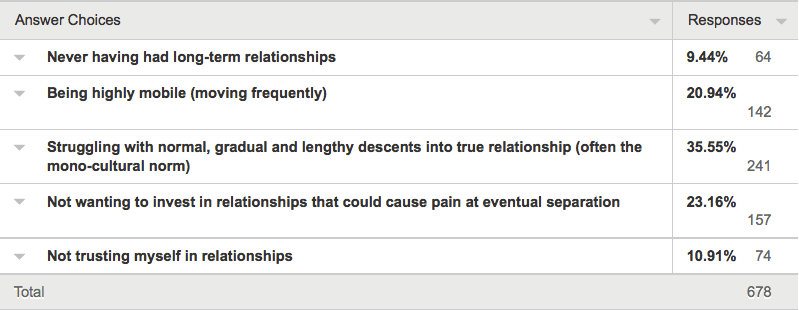
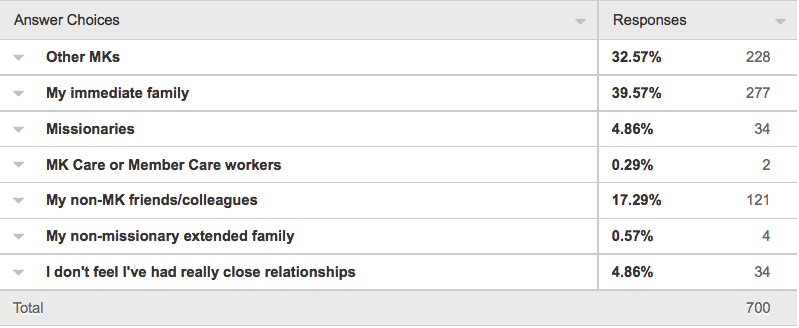

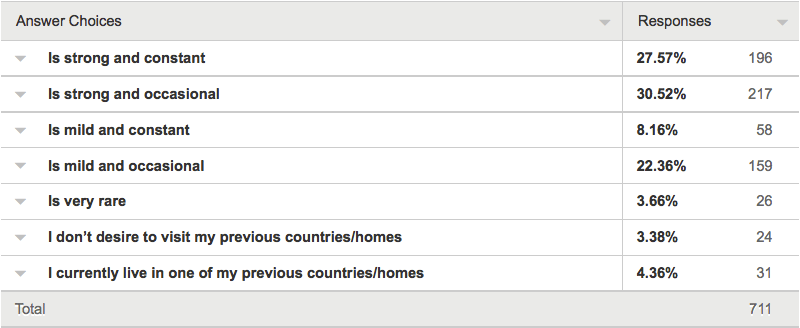
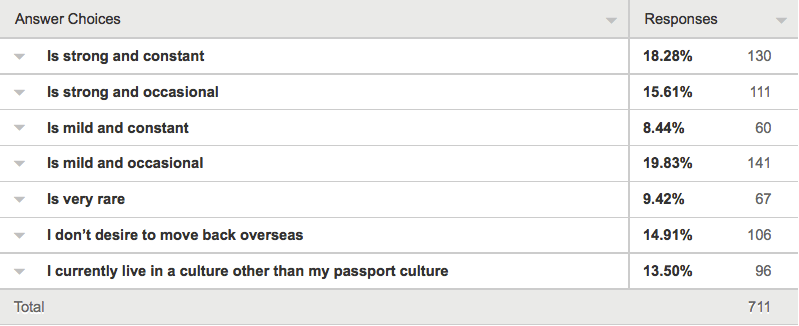




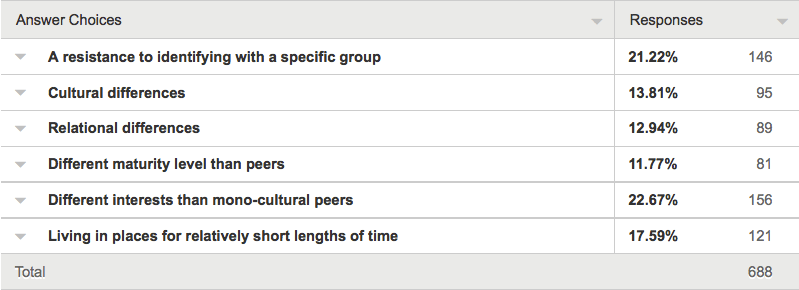
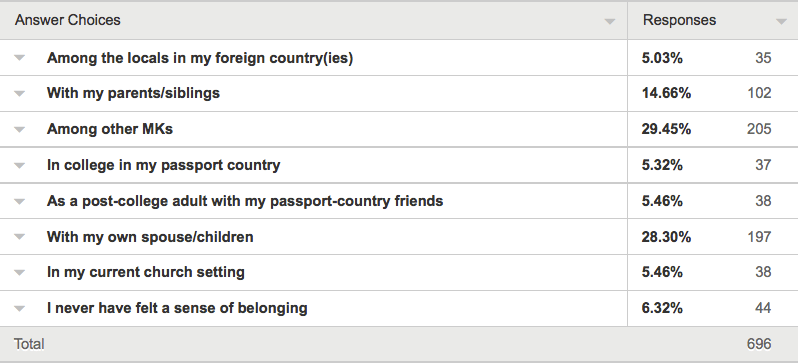




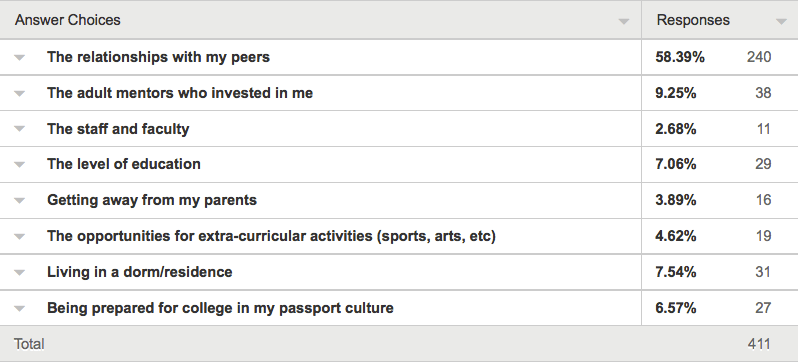
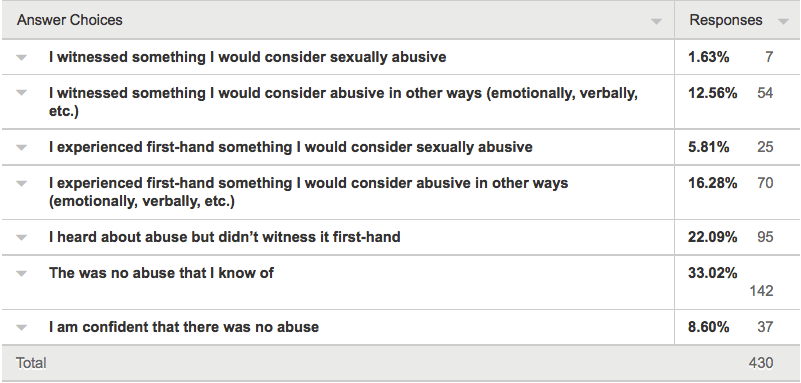
Robin Harbrecht
I have several thoughts after reading over this survey:
1. It is encouraging because you usually hear so much about the negative side that you might think it was more pervasive than it is. According to this survey, however, it sounds like it’s possible that the majority had a positive experience, and that they still have a relationship with God.
2. Any number of the people that had problems (with relationships, craving deeper relationships, and others), might have had these problems even had they not been MKs. It might just relate to being in the “human family.” Or maybe it was their personalities. I think I’m in this category.
3. It sounds like too many parents “dropped the ball” spiritually. On the other hand, maybe this can also be said of the general American population, as well as the missionary population; it’s just that the MK population is being studied here.
Since we get our idea of God from the authority figure(s) in our lives, it is heartbreaking to me that many parents did not communicate the love, or the true nature of God’s character, to their offspring. It makes it worse here because MK’s parents were representing God to the world.
But over all, this survey is encouraging.
Trey R.
That’s an impressive amount of data. Thanks for sharing the results!
Mikayla G.
Thanks so much for doing this survey and sharing the results. It was so good for me to process as I did it and to read results and realize that I am not the only one!
Wilma F.
So, so thankful for this! Will look forward to reading the entire report.
Rebekah H.
Wow, thank you so very much, how time consuming this project must have been. I got teary eyed at times reading the responses and can so relate! I was so glad to read that despite all the difficulties, most MKs are still following the Lord! Blessings and many thanks again.
Joyce Porte
I think there were generational differences. It would have been good to separate those MKs now under 50 to those over. Second World War end saw a huge difference in the type of missionaries who raised their families on the field, especially in how those children were raised.
A study of younger MKs and the vast, alarming numbers of them experiencing broken marriages is worrisome.
Jodi
I loved reading this survey, Michele–well done! I could go on and on about my thoughts on all the different topics covered in the survey, but I feel like the data speaks for itself. The one thing I found humorous and comforting: as I scrolled through all the comments I couldn’t figure out which comments were mine because a majority of them sounded like me. 🙂 It’s good to know that I’m not as alone and “out there” as I thought I was!
Tim Bannister
HI. Thanks for the hard work you put in to this. I found it VERY interesting reading. As a former MK educator, and the spouse of an MK, and the parent of four MKs, I would be interested in hearing any specific insights into how the boarding school experience could be enhanced. I loved teaching MKs, I know I made my mistakes and probably screwed up a few lives with poorly chosen words and bad mood days, but loved almost every minute of it. I deeply value the ongoing relationships I have with many former students and colleagues. They are very precious to me. So, as a favour, I’d love to hear any insights you (or others) would be able to share. Thanks. Banno
Janet adkins
Amazing study and fascinating responses. Really none of them were a shock to me. I am an MK and I have 8 children. I am also married to an MK. I love working with MK and would love to know how to do my job better. I have been a student at three boarding schools and also serve as a staff member at one of the boarding schools. I find it confusing to know just what is the best way to reach out to MKs as it often becomes so normal to me. But I passionately love to be completely dedicated to serving these kids.
Oscar
It is a very good insight into MKs view of their past.
My background as an MK was with a large Florida based mission. The complicating factor was that our family was part of a small group of non American’s who served. Alas we found out when we arrived on the field that we would be doing the jobs that American missionaries didn’t want to do and we would be working much harder than they would. While we had been well prepared for the culture shock of being in primitive societies, nothing had prepared us for the shock of being treated as appallingly as we were by those who were supposed to be co workers.
Eventually my parents were dismissed, just like almost all other New Zealanders. Their house and contents were confiscated and they were left destitute.
I’ve managed to track down the handful of New Zealand MKs linked with this organisation. About half of us have no contact with at least one of our parents, a disproportionate number are in and out of psychiatric care. Attempted suicide is too common and faith in God considerably absent.
I was one of the lucky ones who survived relatively intact, despite the years of abuse. But a survey would reveal that many did not and never will.
David Tan
How can I get a copy of complete survey for Asia Member Care Network. I am the founder and volunteer administrator.
Beth
This is very helpful. We will soon be raising a young MK, and I’m thankful for our mission as well as our pre-field training that coincides so well with your research. Reading the book, Third Culture Kids as well agrees with much of your data. I feel a paradox: “Help, Lord, what are we getting ourselves into?!” and “Wow, I’m so thankful for all the supports that are out there now for MKs and their parents.”.
[BLOCKED BY STBV] FOR THE HURTING – Lessons from a Wall |
[…] View the results of my Adult-MK Survey here […]
Nerida Holmes
Do you have some resources You can recommend as I am counselling an adult MK at the moment
[BLOCKED BY STBV] phd by dissertation only
phd by dissertation only
SURVEY OF ADULT MKs |
[BLOCKED BY STBV] doctoral thesis writing
doctoral thesis writing
SURVEY OF ADULT MKs |
Brenda Lane
This is an interesting survey. I was a PK not an MK but several comments resonated. I wonder if some of those who have walked from the faith are actually rebelling against their parents, perhaps due to witnessing their parents less than perfect example of Christ-likeness in the home or simply avoid any pressure to live up to a certain standard.
Ed Lauriault
God used my being born outside the US and grow up in another country to call me to be a missionary, have me meet my wife, not be prejudiced against black folks and enable me to figure out how to make things work. He knows what He is doing.